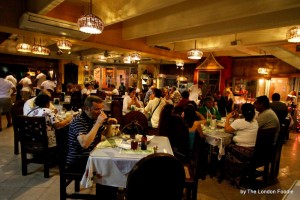
When I was part of a social group of deaf people during the 1970s, a popular outing would be to a pizza restaurant. “Restaurant” is a word I use loosely – these places were large fast-food feedlots. There would be about 15 to 20 of us, seated at benches in a cavernous dining hall. The noise was intense. I could never work out where it came from; I remember being hit by a wall of sound. It reverberated off dark wooden tables, benches and floorboards. The only way we could make ourselves understood was to shout at each other. But it was a happy form of shouting which continued as platters of massive pizzas were banged down in front of us. We must have created a fearful racket.
These were during the days before many of us acquired sign language. Most of us were teenagers, having left school a year or two previously. If my experience was any guide, we had emerged from the isolation of mainstream schools in which we remained subdued and passive. Now, for almost the first time, we were with other deaf people in a social environment in which it was suddenly possible to hear nearly everything that was said. And not surprisingly, we shouted. We shouted hellos, gossip, jokes, smartarse comments and everything else. We shouted in ways we had rarely done before.
Issues about noise in restaurants surface from time to time, but nothing fundamentally changes. There are places and circumstances when noise is not a bad thing. Noise requires energy, and when you have energy to spare, a noisy restaurant is a very good place to be. The energy of noise feeds off people, and especially, derives from the power of a shared experience.
There is no one universal experience of dining out. It can range from a boisterous impromptu Friday-after-work celebration, to the kind of dining that you see in films – a romantic head-to-head or a catch up between old friends. In deaf terms, films which include romantic candlelit dining experiences are ludicrous scenarios where the lovers magically hear each other, the first time and every time.
But even so, there is a correlation between the number of diners and the level of shouting. You expect that a Greek wedding will be noisy. Shouting has a certain joy and can generate its own ambience.
I will never know what other hearing people nearby thought about the noise generated by us deaf youngsters in those 1970s feeding barns. It’s quite likely they did not give us a moment’s thought, perhaps because they were too busy shouting themselves. That’s the kind of places they were.
Restaurants that try to be all things to all kinds of groups run the risk of pleasing nobody. There are enough restaurants, cafes, and bars now for some to be seen as a place for manifold kinds of encounters. So popular cafés might have: Thursdays for pay-night shouting; Fridays for freedom-from-work shouting; Saturdays for my-footy-team-won shouting; and Sundays for that quietly furious shouting between those with relationships on the skids. And there should be a special time and place for late-blooming deaf adolescents and their joyful shouting as they discover what it’s like to be on equal terms with other people.
Leave a Reply